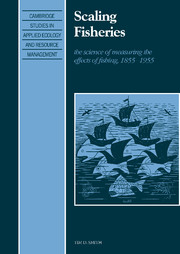Book contents
- Front Matter
- Contents
- Acknowledgements
- Preface to the Paperback Edition
- References
- Units used in the text
- Part I INTRODUCTION
- Part II DEVELOPING METHODS, 1855–1940
- 2 Research approaches, 1855–1890
- 3 Measuring the effect of fishing, 1890–1900
- 4 The International Council for the Exploration of the Sea, 1900–1920
- 5 Predicting fluctuations, 1920–1930
- 6 A priori methods, 1930–1940
- Part III THREE PARTIAL THEORIES, 1940–1955
- Notes
- References
- Index of people
- Subject index
2 - Research approaches, 1855–1890
Published online by Cambridge University Press: 22 September 2009
- Front Matter
- Contents
- Acknowledgements
- Preface to the Paperback Edition
- References
- Units used in the text
- Part I INTRODUCTION
- Part II DEVELOPING METHODS, 1855–1940
- 2 Research approaches, 1855–1890
- 3 Measuring the effect of fishing, 1890–1900
- 4 The International Council for the Exploration of the Sea, 1900–1920
- 5 Predicting fluctuations, 1920–1930
- 6 A priori methods, 1930–1940
- Part III THREE PARTIAL THEORIES, 1940–1955
- Notes
- References
- Index of people
- Subject index
Summary
[P]robably all the great sea-fisheries, are inexhaustible.…
Thomas Huxley 1884It is a mistake to suppose that the whole ocean is practically one vast store-house.
Ray Lankester 1884The differences in opinions about the causes of the fluctuations in the catches of fish described in chapter 1 came into clearer focus in London between Monday 18 June and Friday 20 July 1883. The occasion was the Great International Fishery Exhibition, and two of the most influential scientists in England offered their opinions on the effect of fishing during public lectures. Thomas Huxley argued that humanity's efforts could have no effect on subsequent catches, while Ray Lankester argued that catching female fish resulted in the absence of the young fish that they would have produced, and that this absence had an effect.
These two opinions had important economic and political consequences, and were similar to ideas expressed in a report on the state of fisheries laws commissioned by landlocked Austria a few years earlier (Peyrer 1876 p. 670). He noted arguments by some that ‘the disregard of all protective measures, and of all regulations limiting the methods of fishing, will, in the end, prove disastrous to the salt-water fisheries, in the same way as with our river and lake fisheries,’ while others demanded ‘complete freedom from all those limitations which only quench the spirit of enterprise.’
- Type
- Chapter
- Information
- Scaling FisheriesThe Science of Measuring the Effects of Fishing, 1855–1955, pp. 38 - 69Publisher: Cambridge University PressPrint publication year: 1994

